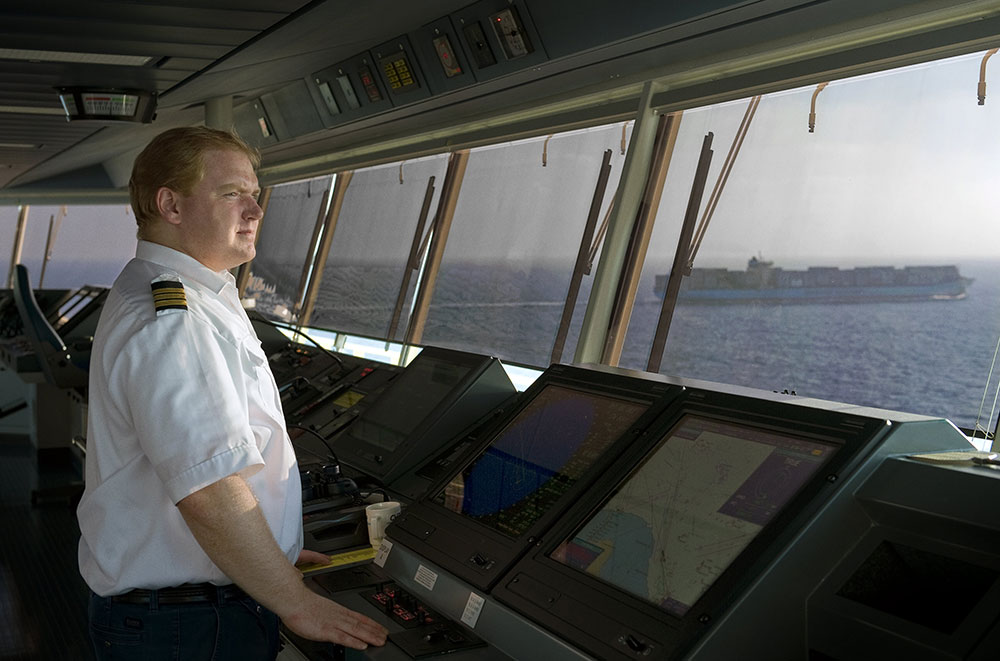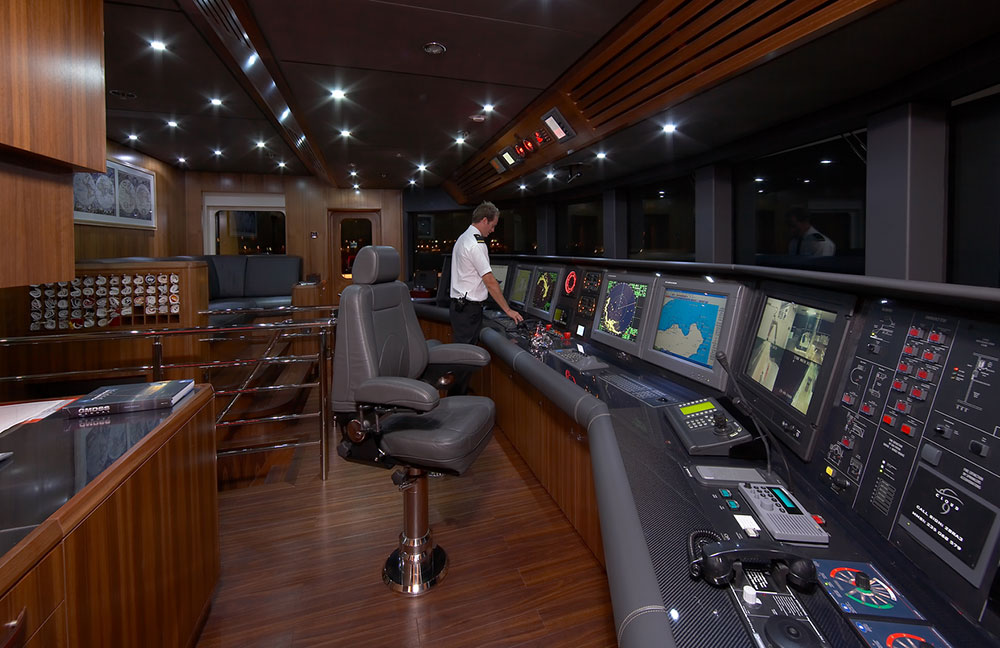Under the captain’s management, the deck department is responsible for the safe navigation and operation of the vessel, both at sea and in port.
While the safety of the vessel and everyone on board is your prime responsibility, all deck operations and maintenance are also managed by the team.
Deck officers are a vital part of the on-board management team, taking charge of an expensive vessel and its equally valuable crew, guests or cargo. You will take key decisions on manoeuvring the vessel and controlling its navigation, communications and security.
Deck officers maintain watches on the bridge at sea and about the ship in port. They are responsible for passage planning, safe navigation of the vessel, cargo loading and discharge, ship stability, communications and maintenance of the hull and deck equipment.
The ship’s captain, or master, is in overall command with ultimate responsibility for the safety of the crew, vessel, cargo and environment. Only navigation officers can be promoted to the rank of master.
Skills and attributes
Members of the deck department are well trained and experienced mariners, having gained and developed their professional expertise and skills in one or more of the maritime sectors.
You’ll need to be decisive, unflappable and able to inspire confidence in others, as well as being a good team member with effective communication skills. Confidence, enthusiasm and self-reliance are also essential attributes.

Roles
In overall command of the vessel, the captain has full responsibility for its safety and that of the crew, passengers and cargo.
Captains have extensive maritime qualifications and experience, excellent seafaring knowledge, a good grasp of accounting and administration, and must deal with authorities on health and safety, security, and environmental awareness matters.
Second in command, the chief officer or chief mate is directly responsible for all deck operations including cargo storage and handling, deck maintenance and deck supplies.
The chief officer is also in charge of the second and third officers and deck hands, and undertakes bridge watches, as well as being responsible for the security of the vessel and environmental awareness.
The second officer takes specific responsibility for navigation, the upkeep of charts, and software. They oversee navigation and radio equipment and undertake bridge watches at sea, and may also be the vessel’s designated security, safety or medical officer.
Normally the first post-certification appointment for a former officer cadet, the third officer undertakes bridge watches and understudies the second officer.
The third officer is also responsible for making sure the fire fighting equipment and lifeboats are in order.
Sometimes known as the senior deck hand, the bosun is usually responsible for the maintenance and exterior cleanliness of the vessel and oversees all deck operations in conjunction with the duty officer.
An entry-level job for newcomers who may or may not have basic seafaring knowledge but are willing to learn on the job.
This is a hands-on role which includes vessel maintenance, deck operations and general duties.
Our career progression charts are designed to give you a clear guide to the best route and courses required to further your career.
Career options
Merchant Navy
Newly qualified deck officers will usually join their company’s fleet as a third officer, undertaking bridge watchkeeping duties at sea and operational duties in port, with responsibility for the safety of the crew, ship, cargo and environment.
As their skills and experience develop, they can progress to higher certificates of competency, leading eventually to certification as ship’s captain (master) and possibly to the command of their own vessel.
Numerous opportunities also exist for qualified navigation officers ashore. Shipping companies often recruit shore based marine superintendents and fleet operations staff from their seagoing officers. Harbour authorities recruit experienced officers to train as pilots, harbour masters and port operations managers. Classification societies, such as Lloyd’s Register of Shipping, and marine insurance companies require the officers’ skill and experience to fill roles such as hull and cargo surveyors. The MCA also require surveyors and examiners, while maritime colleges recruit lecturers and assessors.

Superyachts
Working on a superyacht is far from a vacation and never an easy option. You will be expected to:
- Be professional at all times
- Work long hours
- Live in small, tight crew quarters
- Offer 'service with a smile' and be polite at all times
- Be away from home for long periods.
Unlimited certification
Many new superyachts now exceed the 3,000GT limit that yacht certification meets, meaning officers will be required to gain unlimited certification. The good news is that deck officers who have served on yachts over 24 metres can gain unlimited certification from their yacht certification.
The ability to progress to Master Mariner (Unlimited) is the pinnacle of maritime education and training. Many recruitment agencies are reporting that deck officers with unlimited certification AND yacht experience are in very high demand.
Achievement of unlimited certification is less daunting than it might initially seem. In 2011, the rules for sea time changed, and sea service gained on yachts over 24 metres counts towards unlimited certification.
A crew member with 36 months' (1,080 days) qualifying sea service on a yacht over 24 metres and 80GT, who has been involved in bridge watchkeeping duties for at least six months, can apply for a Notice of Eligibility (NoE) to take a course leading to an OOW (Unlimited) CoC.
Sea service is counted in the following way:
- All actual sea service plus stand-by service (to a maximum of 14 consecutive days in one period, regardless of any further time spent standing by) plus yard time (to a maximum of 90 days). The total must equal or exceed 1,080 days.
- Further periods of stand-by may be counted, but only when the vessel returns after proceeding to sea on passage.
You should ensure you apply using the MCA form MSF 4274 but submit yacht sea service testimonials in accordance with MSN 1858, section 4.
NOTE: You do not need to hold an RYA/IYT Yacht Master or Officer of the Watch (Yachts less than 3,000GT) to be eligible to attend this programme.
IMPORTANT: we strongly recommend you apply for your Notice of Eligibility before applying for this programme. This confirms that the MCA will accept your qualifying sea service.
The overall duration of the programme is 27 weeks. HNC tuition and assessment lasts for 23 weeks and includes bridge watchkeeping, navigation, chartwork, tides, emergency response and communications, cargo work, meteorology, ship stability, ship construction, and law and management.
At the end of the course, you will also sit two SQA written exams (Navigation, and Stability and Operations). On successful completion a Higher National Certificate (HNC) Nautical Science will be awarded.
You will undertake a two-term course of study with continuous assessment and end of course tests in most subjects, plus the two written SQA exams mentioned above. The programme also includes: Efficient Deck Hand (EDH), NAEST(O), HELM(O), MCA Signals, SQA exam preparation and MCA oral exam preparation.
NOTE: by completing NAEST(O) you will also be issued with an MCA-approved generic ECDIS certificate. The OOW (Unlimited) CoC can be endorsed to also serve as a chief mate (yachts less than 3,000GT) by additionally completing the five-day Human Element, Leadership and Management (Management Level) course.
You must also hold STCW certificates in: Medical First Aid, Advanced Fire Fighting, Proficiency in Survival Craft and Rescue Boats (PSCRB) and GMDSS GOC before taking your MCA oral exam. These courses can be taken with us.
Offshore oil and gas
For Merchant Navy deck officers, many opportunities exist within the offshore oil and gas industry to make a transition into this sector. These can be with shipping companies that operate offshore support vessels within the industry sector or other companies that support the offshore industry in the area of marine related operations (eg, mobile offshore drilling units).
The maritime skills and STCW/academic qualifications, together with the general marine background of Merchant Navy deck officers often prove to be an attractive asset to such companies when filling positions.
People with maritime backgrounds can progress in rank or position as their experience within the industry develops, possibly up to the position of barge master or above, with additional industry related qualifications.
Opportunities in the offshore industry for mariners have now become very global, and access to foreign areas of offshore activity has opened significantly. Working in these areas as far away as Australia on regular short periods and enjoying good terms and conditions of employment is not uncommon.
Renewables
The specific career pathway in the renewables sector will depend upon previous relevant experience (if any) and area of intended operation and vessel tonnage. However, it should be noted that all the occupational positions (irrespective of area or tonnage limitations) require successful completion of Maritime and Coastguard Agency (MCA) approved study routes and exams together with relevant sea experience.
- Master (skipper) – Legally responsible for the safety of all persons on board, environment, vessel and cargo. The master may or may not be a watchkeeper while the vessel is at sea/in port dependent upon the manning scale. The master usually berths/unberths the vessel and takes charge of manoeuvring in confined waters.
- Chief mate/chief officer – Assistant to the master and in charge of watchkeeping, passenger and cargo operations. The chief officer is traditionally responsible for running day-to-day deck operations, organising maintenance and managing crew working hours and resources.
- Deck officer (OOW - officer of the watch) – Assistant to the master and in charge of watchkeeping (navigation while at sea, passenger/cargo operations/mooring).